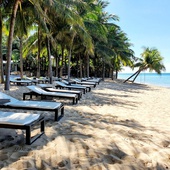Common Travel Scams and How to Avoid Them
TAXI TRICKS
Scam scenarios:
When traveling in Vietnam, tourists should remain cautious of illegal taxi drivers who often use various tactics to overcharge unsuspecting foreigners. One common scheme involves using a modified meter that rapidly increases fares compared to standard taxi meters. Additionally, these drivers might suggest longer routes that they label as “shortcuts” to further inflate the fare. Occasionally, they may promise to show tourists interesting places only to later request tips. However, most tourist information is easily accessible through reliable sources like local maps, hotel receptionists, or browsing the internet.
How to avoid:
To steer clear of scams, opt for reputable taxi services such as Mai Linh, Vinasun, and Taxi Group, recognized for their integrity. Ideally, ask your hotel receptionist to arrange your taxi for added security.
XE OM TRICKS
Scam scenarios:
Using motorcycle taxis (xe om) can be an exhilarating experience in Vietnam, yet travelers must stay vigilant. With no requirement for certification to operate as a motorcycle taxi driver, dishonest individuals may exploit this system. A prevalent scam is the “go first, pay later” scheme, where drivers offer a lower rate than a taxi only to demand an inflated fare at the trip's conclusion, often attributing it to “high petrol costs.” Just like unscrupulous taxi drivers, they might take lengthy detours to maximize earnings. In smaller towns, some drivers may even lead tourists to obscure locations, coercing them for money and belongings.
How to avoid:
To protect yourself, trust your instincts and avoid dubious motorcycle taxi operators, particularly when traveling alone or late at night. Consider using licensed ride-hailing apps like Grab, which are widely available and reliable.
HOTELS
Scam scenarios:
Many travelers to Vietnam may lack familiarity with local accommodations, making them targets for manipulative hotel practices. Some establishments employ misleading names like “Royal” or “Grand” and fabricate positive online reviews to attract business. They might advertise lower room rates only to inform guests that those prices apply to already-booked standard rooms, leaving them no choice but to pay for pricier deluxe options. Additional fees may be tacked on at checkout, even doubling the initial quote, with threats of withholding passports to coerce payment.
How to avoid:
Book your hotel in advance through reputable booking platforms, and bring along confirmation emails or vouchers. Spending a bit more upfront can save you from unpleasant surprises later.
TRAPS AT AIRPORT
Scam scenarios:
At the airport, taxi drivers and unscrupulous hotels may collaborate to ensnare tourists. Drivers often monitor information about arriving travelers, such as names and nationalities, and pretend to be official representatives there to assist. If they can lead tourists to a “partnership hotel,” they earn a commission while travelers end up at low-quality accommodations rather than their intended destinations. Sometimes, even if a tourist knows where they want to go, these drivers might feign communication with the intended hotel, diverting them to an undesirable alternative just a short distance away.
How to avoid:
Whenever possible, arrange for pickup directly with your hotel in advance. Alternatively, you can exit the airport and hire a taxi while calling your hotel to confirm the driver knows your destination. For more information, check out our updated Guide to Airports in Vietnam for current transport options.
LONG HAUL BUS
Scam scenario:
Long-distance buses, particularly in rural areas of Southern Vietnam, can pose significant challenges for travelers. These buses are often overbooked and operated by assertive assistants who might resort to intimidation should a passenger resist their demands. Passengers can find themselves forced onto crowded buses with inflated fares, only to be sold to another bus that demands additional fees. This cycle of exploitation can continue until travelers feel pressured into compliance.
How to avoid:
Consider traveling with trusted bus companies like Hoang Long, Mai Linh, and Phuong Trang, which provide reliable services at fair prices. Alternatively, look into open tour bus tickets where fellow travelers may offer companionship and assistance.
KARAOKE
Scam scenario:
Karaoke establishments, while a popular form of entertainment in Vietnam, can also be rife with scams, particularly targeting male tourists. As prostitution remains illegal in Vietnam, some bars use deceitful tactics to attract male customers, offering introductions to women under false pretenses. When tourists accept, they may end up facing exorbitant charges for drinks and services, sometimes fortified by intimidation from the establishment’s staff.
How to avoid:
Refrain from engaging in any illicit services; remember that prostitution is illegal in Vietnam. If you enjoy karaoke, visit with local friends who can provide guidance.
STREET VENDORS
Scam scenario:
While many street vendors in Vietnam are friendly and provide legitimate goods, others may use deceptive tactics to exploit tourists. Some may offer to take photos with traditional clothing or gifts, only to later demand payment or tips for their “services.” Vendors’ children might also employ manipulative tactics to solicit money from visitors, often leading to uncomfortable interactions.
How to avoid:
Practice a firm yet polite refusal when approached, and if necessary, walk away without engaging. For more information, consult our Guide to Street Vendors in Hanoi to understand where to shop and how to interact.
RESTAURANTS
Scam scenario:
While Vietnam boasts numerous delightful restaurants, there are establishments that prioritize profit over quality, particularly targeting tourists. Some places may not list menu prices, mislead visitors, and charge exorbitant costs after the meal, particularly if customers were unaware of their rates. Identifying the price in one currency during ordering and charging a different, inflated exchange rate upon payment is also a common ploy.
How to avoid:
Refer to recommendations on our restaurants page prior to dining out, and help us report any establishments that should be blacklisted due to scams.
PHOTOGRAPHERS
Scam scenario:
Street photographers may appear friendly and approachable but can also be deceptive. They often offer to take pictures at low rates, only to present an inflated number of desired photos after the fact, charging far more than initially discussed. They usually promise to send these photos, but many times they are never delivered, and tourists left disappointed.
How to avoid:
Bring your own camera and ask fellow travelers or friendly bystanders to help take your pictures. Photo editing services can also be found at reasonable prices in Vietnam.
"PRISON" RESTAURANTS
Scam scenario:
Though less prevalent now, the “prison restaurant” scam remains a notorious danger for some travelers. These establishments, often located along highways or near bus stations, may trap diners by locking them inside until they agree to pay exorbitant prices for meals. When refused, patrons could face threats or physical violence from staff.
How to avoid:
This scam is less common than in the past; however, to fully protect yourself, opt for established bus services that are recognized for their reliability.

Latest Travel Alerts & Updates for Vietnam
Can I travel to Vietnam right now? What are the requirement? When can I expect to be allowed to travel to Vietnam? Find answers to these questions with our frequently updated travel alerts.

Best Time to Visit Vietnam: When to Go & What to Expect
"When is the best time to visit Vietnam" is one of the most common questions that spring up to mind for all trip planners. Overall the golden time to visit the country is March-May and October-early December.

What $1 Can Buy in Vietnam
Although the cost of living has risen tremendously in Vietnam in recent years, you can still to live by with few dollars per day in your pocket. Below is a quick summary of what a dollar can be worth in various cities in Vietnam.













